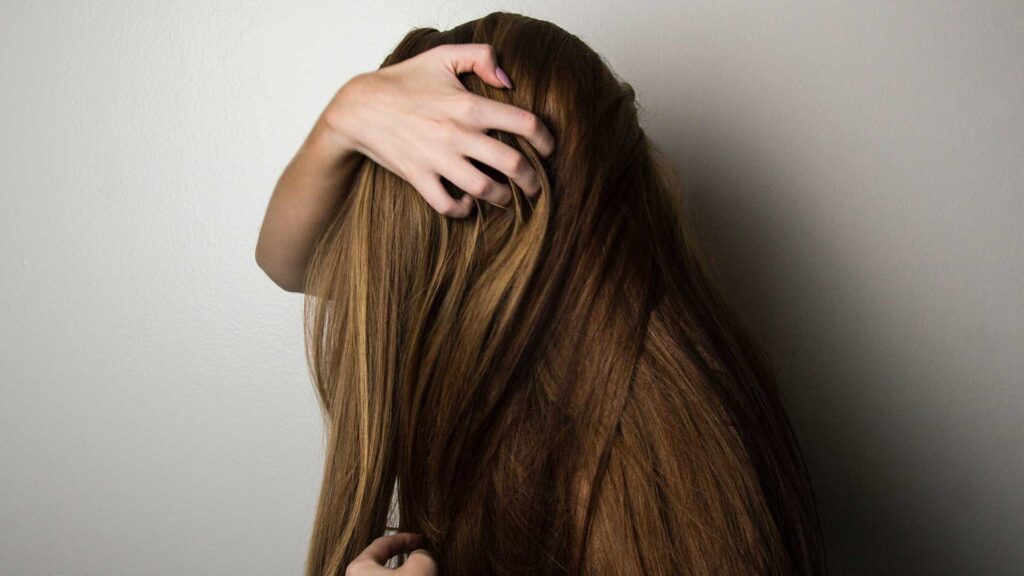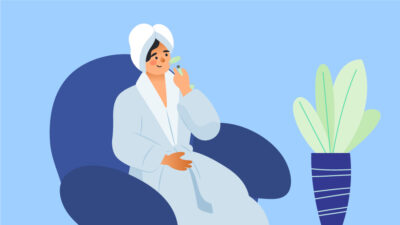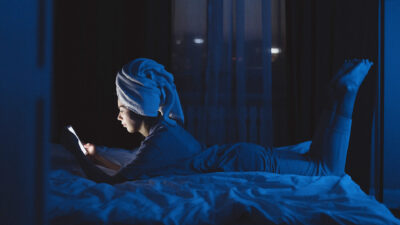
In the pursuit of strong and luxurious hair, we’re often caught up in finding the perfect shampoo or questioning how frequently we should even be washing it. While these factors do play a role in the condition of our hair, there’s one essential element that’s missing from the conversation: our sleep quality.
For instance, is there a connection between sleep and hair loss? How can you improve your sleep in a way that also supports your hair? We’re answering these questions and more.
Note: The content on Sleepopolis is meant to be informative in nature, but it shouldn’t be taken as medical advice, and it shouldn’t take the place of medical advice and supervision from a trained professional. If you feel your child may be suffering from any sleep disorder or medical condition, please see your healthcare provider immediately.
Long Story Short
- Sleep and hair loss are not directly related, but lack of sleep may play a role in factors that influence hair growth, such as chronic stress.
- Improving your sleep hygiene habits can not only improve your sleep but also your stress, which ultimately may benefit your hair.
- Always speak with your healthcare provider if you’re concerned about hair loss. You might also ask your hair stylist for tips regarding protecting and strengthening your hair.
Can a Lack of Sleep Cause Hair Loss?
There’s no solid evidence indicating lack of sleep alone is a direct cause of hair loss. However, research does suggest that a chronic lack of sleep can promote stress, which may slow hair growth. (1)
When your sleep is off, it affects every other aspect of your life, which may include the overall condition of your mane. Too little or too much sleep may escalate stress and trigger hormone fluctuations that affect your hair. On the other hand, getting the recommended 7-9 hours of sleep per night for adults may help reduce stress. (2)(3)
Stress and Hair Loss
How does stress promote hair loss, exactly? Well, when you’re under stress, your entire body can feel the effects — even if they’re not obvious to you right away.
As part of your stress response, your body releases a number of hormones. In the short term, this is designed to benefit your survival, but over a long period, elevated stress hormones can have unwanted health effects, such as depression, anxiety, cognitive impairment, and even heart disease. (4)
In a 2021 animal study, Harvard researchers found that a particular stress hormone can actually put your hair follicles in an extended phase of rest. In other words, when this hormone — called corticosterone in rodents and cortisol in humans — remains elevated, it’s essentially telling your hair not to grow. (5)
In addition to identifying how stress can halt hair growth, the researchers were able to determine the pathway that was being impacted. Furthermore, they could target this pathway and add back a molecule that is suppressed under stress — called GAS6 — to stimulate hair follicles to start growing again.
While more research is needed to understand how this works in people, this is a promising start to help treat stress-related hair loss in the future.
How to Improve Sleep
Now that we’ve covered how sleep, stress, and hair loss are related, let’s move on to what we can do about it. While stress management is a multifaceted beast to tackle, a major factor is sleep.
We spoke with sleep expert and board-certified behavior analyst, Charlsie Myers, Ph.D., about how we can improve our nightly Z’s.
She says, “practicing healthy sleep habits, commonly referred to as sleep hygiene, can improve one’s quality of sleep through engagement in behaviors that promote sleep and avoiding behaviors that interfere with sleep. These behaviors can take place throughout the day, as well as right before bedtime.”
Myers recommends the following habits to promote better sleep:
- If you can, go to bed and wake up at the same time every day — yes, that includes weekends or vacations.
- Exercise regularly, but not within an hour of bedtime. (6)
- Get sunlight exposure in the morning and dusklight in the evening.
- Engage in a bedtime routine that includes relaxing activities, such as reading, journaling, or stretching.
- Only use the bed for sleep and sex.
- Create a sleep-promoting environment that is cool, dark, and quiet.
- Avoid exposure to blue light from electronics within 30 minutes of bedtime. (7)
- Avoid heavy meals, alcohol, tobacco, and caffeine, especially later in the day. (8)
- Don’t nap after 3 p.m. or for longer than 30 minutes during the day. (9)
How to Protect Your Hair at Night
While you’re honing in on your stress management and sleep hygiene practices, there are also things you can do to help protect your hair each night. A little bit of added protection can go a long way to prevent further damage.
Here are some tips to consider:
- Use a silk or satin pillowcase. These are naturally hypoallergenic, less abrasive, and don’t remove as much moisture from your skin and hair at night compared to a traditional cotton pillowcase.
- Apply an overnight treatment. If you plan to shower in the morning, an occasional overnight conditioning treatment can help add moisture to your hair.
- Sleep with braids. Gently brushing and then braiding your hair loosely at night may help prevent it from getting tangled and damaged while you sleep. Plus, if you shower and let it air dry before you braid it for bed, this not only reduces heat damage but also gives you beautiful waves in the morning.
- Switch to scrunchies. If you have long hair, you might be used to pulling it back with a hair tie to keep it out of your face at night. While this is okay, switching to a softer tie like a scrunchie can help reduce hair breakage.
It’s also not a bad idea to chat with your hair stylist for more personalized hair protection tips.
The Last Word From Sleepopolis
Hair loss is frustrating, especially when you’re not sure what’s causing it. It’s always best to speak with your healthcare provider first, as they can provide a comprehensive exam to help determine the root cause. While sleep and hair loss are not directly related, there is a likely relationship between poor sleep, chronic stress, and hair loss over time. Targeting your stress management, improving your sleep hygiene practices, and protecting your hair at night may be helpful.
FAQS
Can excess sleep cause hair loss?
Sleep is not directly related to hair loss. However, too little or too much sleep may trigger stress, which may trigger fluctuations in your hormones that impact your hair growth cycle.
How should you sleep to prevent hair loss?
You can help protect your hair at night by doing things like sleeping with a silk pillowcase, using an occasional overnight conditioner, and gently tying it back with a cloth scrunchie versus a rubber band.
Can hair loss from a lack of sleep grow back?
Sleep itself won’t cause hair to regrow, but it’s certainly a good factor in your overall wellness. Getting better sleep may help reduce chronic stress and support healthy hormone levels, which in turn may benefit your hair. If you’re concerned about hair loss, speak with your healthcare provider.
Sources
- Nollet M, Wisden W, Franks NP. Sleep deprivation and stress: a reciprocal relationship. Interface Focus. 2020;10(3):20190092. doi:10.1098/rsfs.2019.0092
- Chaput JP, Dutil C, Sampasa-Kanyinga H. Sleeping hours: what is the ideal number and how does age impact this?. Nat Sci Sleep. 2018;10:421-430. Published 2018 Nov 27. doi:10.2147/NSS.S163071
- Get Enough Sleep. Health.gov. Updated 25 Sept 2024. Available from: https://health.gov/myhealthfinder/healthy-living/mental-health-and-relationships/get-enough-sleep
- Chu B, Marwaha K, Sanvictores T, et al. Physiology, Stress Reaction. [Updated 2022 Sep 12]. In: StatPearls [Internet]. Treasure Island (FL): StatPearls Publishing; 2024 Jan-. Available from: https://www.ncbi.nlm.nih.gov/books/NBK541120/
- How stress causes hair loss. National Institutes of Health. Published 13 April 2021. Available from: https://www.nih.gov/news-events/nih-research-matters/how-stress-causes-hair-loss
- Stutz J, Eiholzer R, Spengler CM. Effects of Evening Exercise on Sleep in Healthy Participants: A Systematic Review and Meta-Analysis. Sports Med. 2019;49(2):269-287. doi:10.1007/s40279-018-1015-0
- Wahl S, Engelhardt M, Schaupp P, Lappe C, Ivanov IV. The inner clock-Blue light sets the human rhythm. J Biophotonics. 2019;12(12):e201900102. doi:10.1002/jbio.201900102
- Espie CA. The ‘5 principles’ of good sleep health. J Sleep Res. 2022;31(3):e13502. doi:10.1111/jsr.13502
- Mograss M, Abi-Jaoude J, Frimpong E, et al. The effects of napping on night-time sleep in healthy young adults. J Sleep Res. 2022;31(5):e13578. doi:10.1111/jsr.13578
- Myers, Charlsie. Personal Interview. September 2024.



